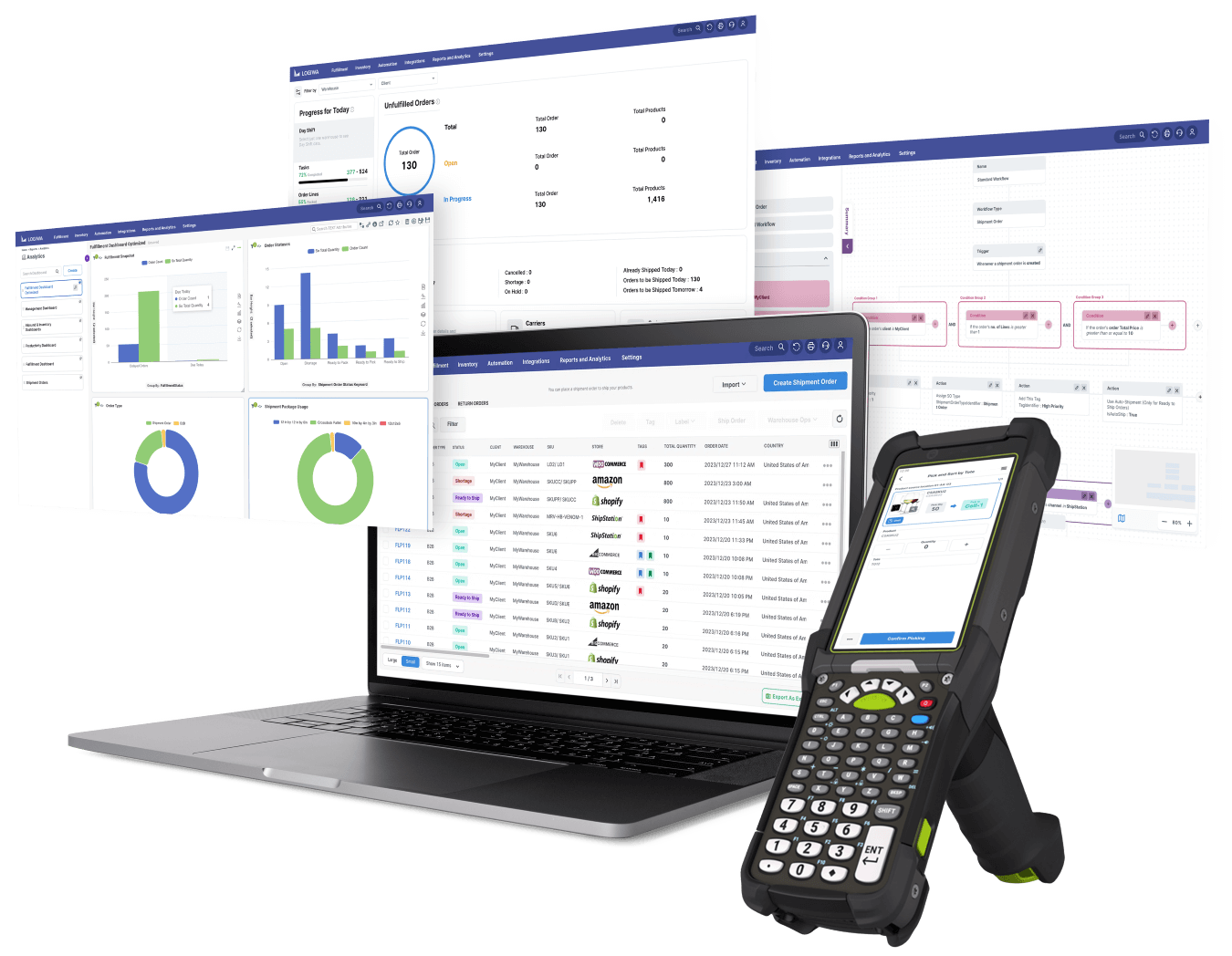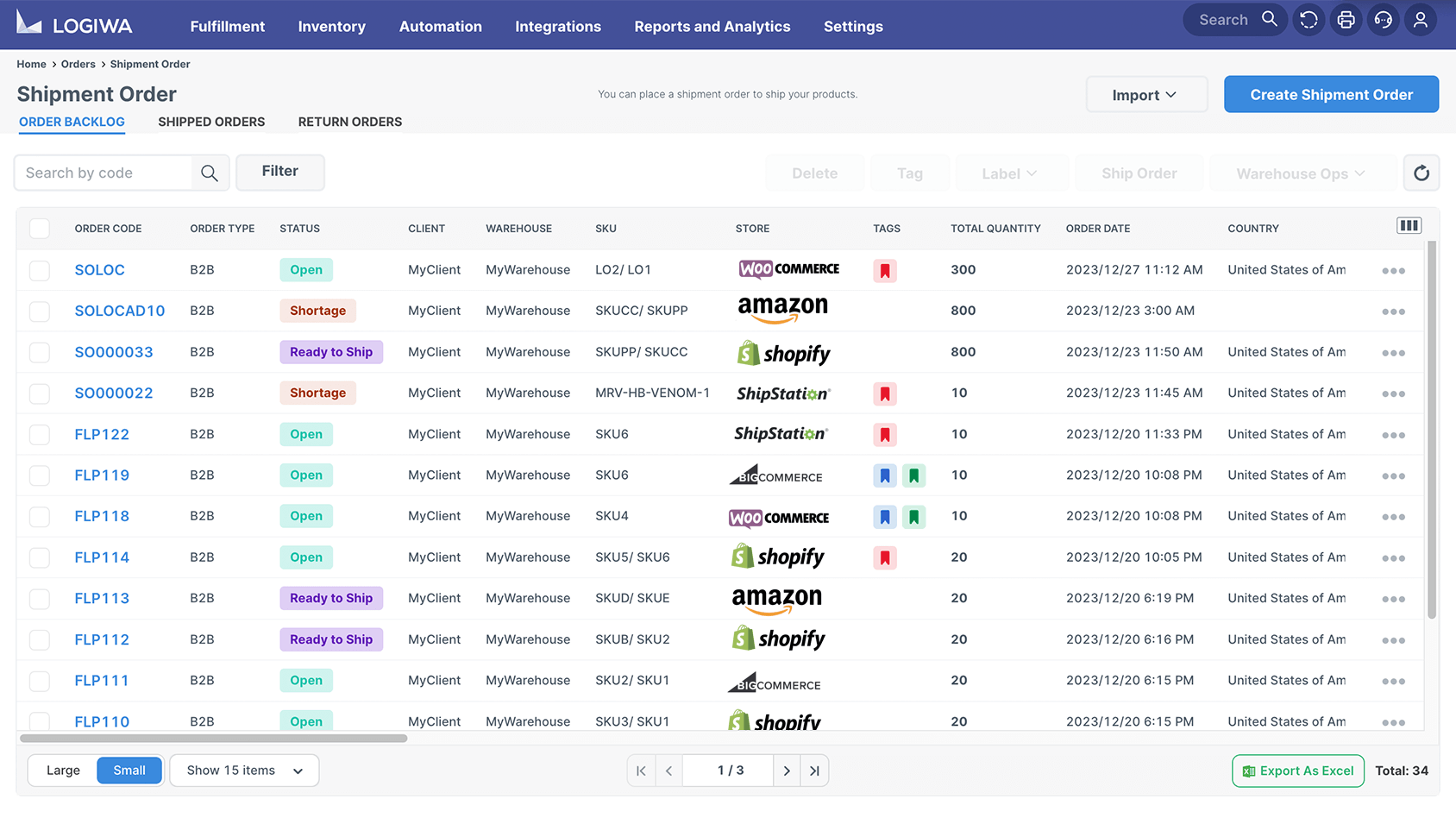Connected Ecommerce
An Advanced Ecommerce WMS to Grow Online Stores with Ease
You Need a Powerful Ecommerce Warehouse Management System
Accurate inventory management and supply chain operations are key for online sellers. With Logiwa WMS, you can streamline these processes and take your ecommerce business to new heights. Logiwa WMS is the ultimate ecommerce warehouse management system. Logiwa helps brands, online retailers and 3PLs streamline processes, maximize warehouse efficiency, and achieve fulfillment excellence.
Let us show you Logiwa IO
Maximize Efficiency and Productivity with Logiwa’s Ecommerce WMS
Seamless integration with popular ecommerce, marketplace, accounting and shipping systems
Full visibility into inventory levels across all locations
Easy connections to your systems with our Open API
Automatic order routing based on custom rules
Seamless integration with popular ecommerce, marketplace, accounting and shipping systems
Integrating Logiwa WMS with your existing ecommerce platforms, such as Shopify or WooCommerce is effortless. Our system seamlessly connects with your online store, automatically syncing orders, inventory levels and shipment data in real-time. We support integration for all standard logistics and warehousing transactions and file types, including the following EDI standards: 850, 856, 940, 945, 753, 754, 810, 846, 855, 128.
Easy connections to your systems with our Open API
It’s easy to connect Logiwa with your stores, custom websites, other warehouses, vendors, ERP, TMS, HR, or business intelligence systems.
Our Open API makes it easy to push or pull any product, PO, order, shipment, customer, shipping label, or report data to and from Logiwa WMS. Say goodbye to manual data entry and focus on growing your business.
Full visibility into inventory levels across all locations
With Logiwa WMS, you gain complete visibility and control over your inventory. Real-time tracking between all your online sales channels and fulfillment centers ensures accurate stock levels to prevent overstocks and stockouts. Our system employs smart algorithms to optimize putaway and reduce picking time, as well as minimize errors and improve order accuracy.
Automatic order routing based on custom rules
Automatically route orders to the best fulfillment center based on product availability, shipping costs, and delivery time commitments to fulfill orders faster and enhance customer satisfaction.
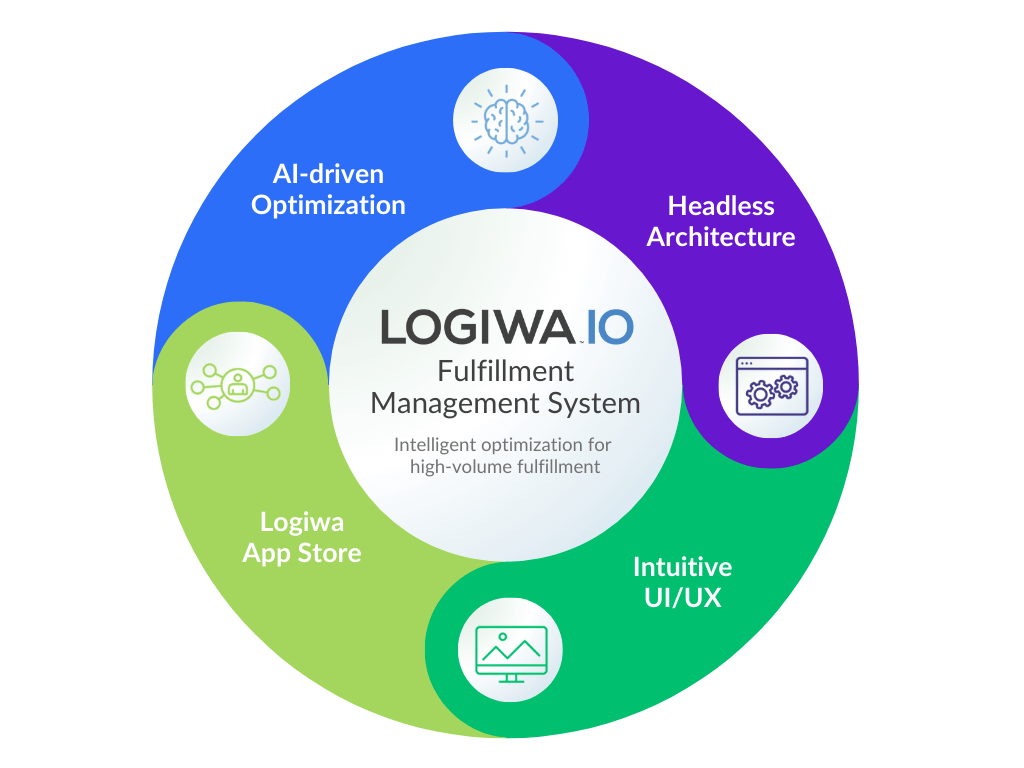
Our ecommerce WMS is part of the Logiwa Cloud Fulfillment Platform built specifically for high-volume B2C and DTC businesses.
The Logiwa Cloud Fulfillment Platform is a fully integrated order fulfillment and ecommerce Warehouse Management System that empowers companies to run a digital fulfillment experience and grow their direct-to-consumer business—without additional headcount.
The key features of Logiwa IO
Multi-Channel Order Management
Warehouse Automation
Real-Time Inventory Tracking
Advanced Shipping and Carrier Integrations
Logiwa WMS consolidates orders, automates routing, and ensures efficient order processing across multiple sales channels with an intuitive interface.
Customer Success
See what our customers say
Logiwa’s Ecommerce Warehouse Management System has Everything 3PLs Need to Achieve High-volume Order Fulfillment Success
Check out all we provide, and then imagine all that power running on your mobile devices in a fully digital warehouse as part of your integrated fulfillment network.
WAREHOUSE AND INVENTORY MANAGEMENT
-
- Unlimited Locations/Bins
- Inventory and Locations Management
- Transfers Between Locations and Warehouses
- Instant Counting
- Purchase Order Management
- Inbound Receiving Management
- PO Notification Email Alerts
- Returns Management
- Safety Stock Reports and Email Alerts
- Shipping Management
- Picking, Packing and Shipping Operations
- Backorders and Damaged Products
- Carrier Rate Shopping
- Shipment Tracking Number Management
- Lot/Batch, Expiry Date, and Serial Number Tracking
- Pick Face Replenishment
CONNECTIVITY AND INTEGRATIONS
-
- Plug’n Play Store Connections
- Plug’n Play Shipment Carrier Connections
- Accounting and ERP Integrations
- Warehouse Robotic Integrations
- Scale Integrations
- Open API and EDI Integrations
- Webhooks
WAREHOUSE PRODUCTIVITY
-
- Individual Order Picking
- Wave/Batch/Cluster Picking
- Batch Shipment Label Printing
- Pick List and Packing Slip Printing
- Kitting/Bundling
- Mobile Picking, Receiving, and Transfers
- Order Packing Screen
- Substitute Products
- Customized Screen Layout
REAL-TIME REPORTING
-
- User Performance and History Report
- Available To Sales Reports
- Safety Stock Reports
- Centralized Inventory Reports
- Location-based Inventory Reports
- Shipment History and Traceability Reports
- Receiving and Traceability Reports
- Shortage Notifications and Reports
- Transaction History and Inventory History Reports
WAREHOUSE OPTIMIZATION
-
- Directed Putaway – Location Suggestion
- Pre-defined Picking Jobs (Single Unit, Multi Unit, Pick, Pack)
- Walking (Picking) Path Optimization
- Put to Wall (Sorting and Consolidation)
- Shipment Rule Automation
- Package Type Selection Algorithms
3PL MANAGEMENT
-
- Multi-Client Support
- Client Portal and Dashboard
- Client Based Setup (Packing Slip, Contracts, and Statements)
- Notifications to Clients
- Customized New Billing Line
- Billing and Contract Management
- Third Party Carrier Account Management
- Billing Integrations with ERPs
- Mark Up Shipment Rate
- Custom Branding
SUPPLY CHAIN MANAGEMENT
-
- Order Routing Across Multiple Warehouses
- Dropshipping
- Consignment Management
Pre-integrated with the leading ecommerce, marketplace, shipping, robotics, and accounting platforms.
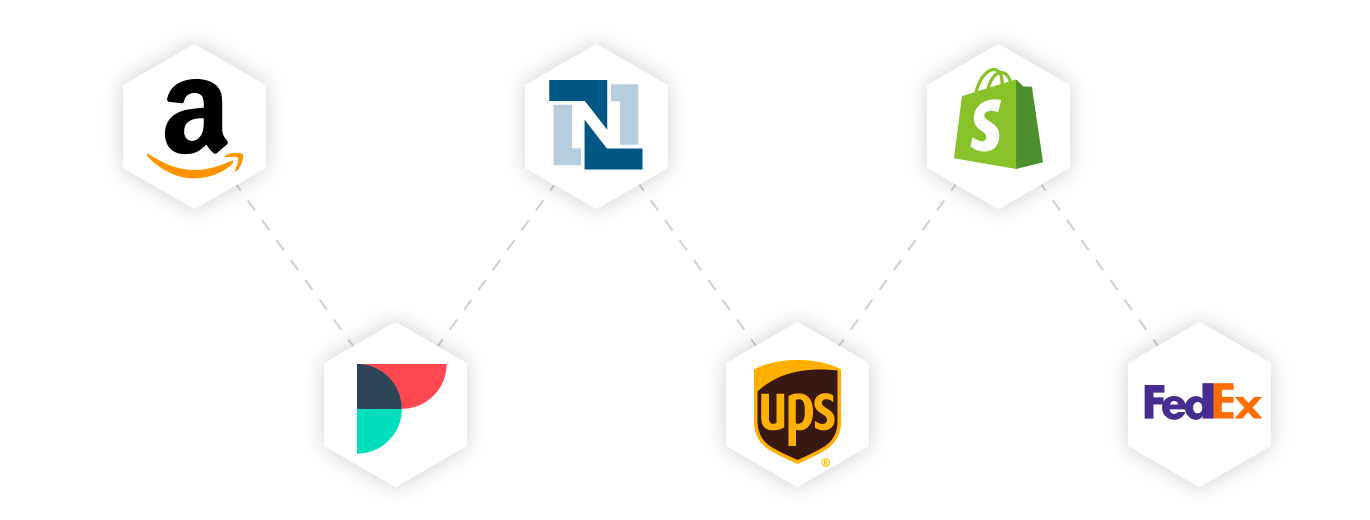
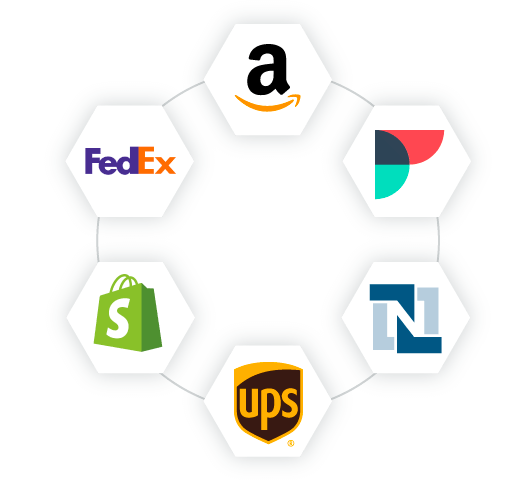
FAQs about Ecommerce warehouse management software
What is an ecommerce warehouse management system (WMS)?
An ecommerce WMS is a software application that helps manage the processes of a warehouse or multi-warehouse fulfillment network supporting ecommerce operations. This can include tasks such as processing orders, managing inventory, and coordinating the movement of product, orders, and items that are ready to ship within the warehouse.
How does Logiwa WMS benefit my ecommerce business?
Logiwa WMS helps to improve the efficiency and accuracy of your warehouse operations by optimizing every aspect of the order fulfillment process, leading to reduced costs and increased productivity. Our software provides you with complete visibility and control over warehouse management, inventory management, and billing processes to improve the speed and accuracy of order fulfillment, increase customer satisfaction, and grow your business.
How does Logiwa’s ecommerce WMS work?
Logiwa ecommerce WMS consists of a central database that stores information about your warehouse and its operations, as well as a user interface that allows warehouse staff to access and update information, and a client portal to keep all relevant parties informed about the status of ecommerce operations. Our system includes features such as business intelligence (BI) tools and easy integrations with your preferred ecommerce platform to process and track orders in real-time.
How is Logiwa’s ecommerce WMS implemented in my warehouse?
The implementation of Logiwa ecommerce WMS consists of four phases, each designed to cater to the specific requirements of your business, such as its size and intricate fulfillment methods. Our approach includes analyzing business processes and change analysis, conducting configuration testing, providing training and best practices, overseeing a dry run, offering assisted go-live support, and delivering post-onboarding follow-up. We use project management tools to ensure clear task assignment and to keep implementation and onboarding on track—all with the goal of successfully completing your first order alongside you.
How does Logiwa’s ecommerce WMS integrate with my ecommerce platform?
An ecommerce WMS can be integrated with your ecommerce platform in a number of ways, depending on the specific software you are using. This can include real-time integration with your ecommerce platform to automatically update inventory levels and process orders, as well as the ability to import and export data between the two systems.
